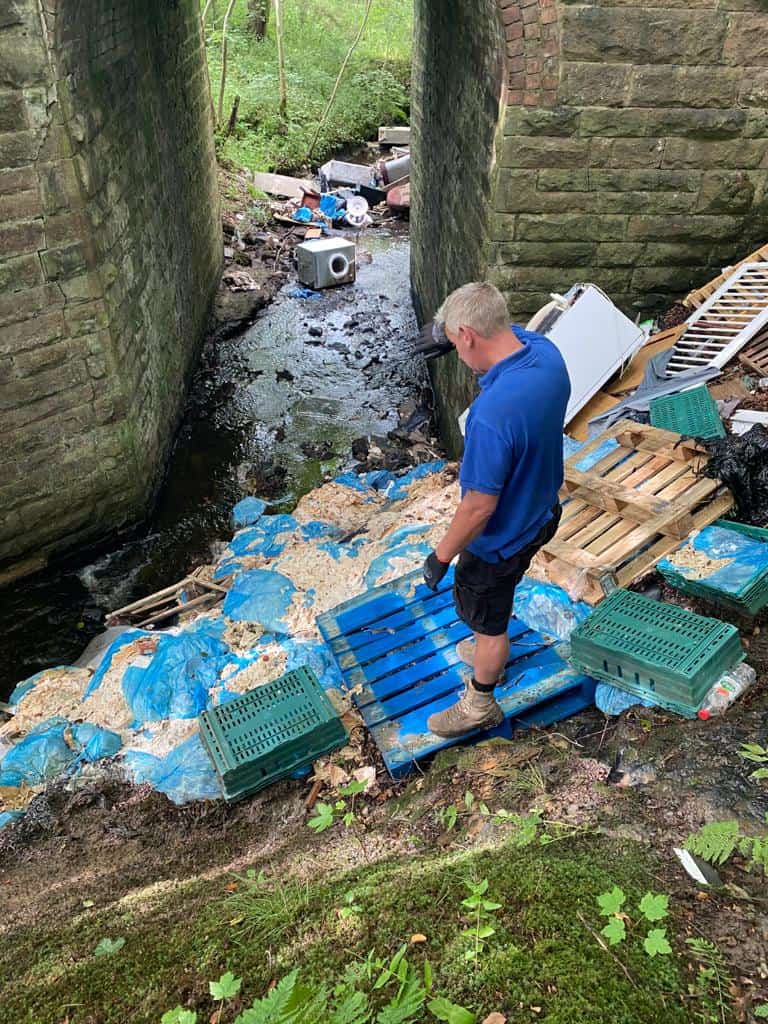CALL TO CARE FOR SCOTLAND’S COUNTRYSIDE
NFU Scotland and Scottish Land & Estates (SLE) are jointly reminding the public and businesses of their responsibility to safeguard and care for Scotland’s countryside.
The call comes following a spate of incidents in the past few months. Many land-based businesses have reported increased instances of rubbish being left by access-takers and wild campers. It also follows a significant spike in cases of fly-tipping of domestic and commercial waste on rural land in recent months – a long-running scourge which, despite the re-opening of Household Waste Recycling Centres in early June, has continued to blight the countryside.
In a recent incident, two tonnes of rotting meat were dumped in a Lanarkshire burn with the farmer left to pay the clear up cost of £2000
NFUS and SLE have written to the Scottish Government setting out a range of suggested measures targeted at clamping down on fly-tipping, which would tighten householder responsibility, increase penalties for offenders, and offer better protection and support for land-holders who are victims of fly-tipping.
With the easing of lockdown measures also chiming with the busy summer holiday period, the two organisations are also encouraging access-takers to enjoy Scotland’s countryside responsibly and with respect as a working landscape and environment.
NFUS and SLE are supporting Zero Waste Scotland’s ‘Scotland Is Stunning – Let’s Keep It That Way’ campaign, which encourages members of the public to enjoy Scotland’s great outdoors responsibly by binning or taking litter home.
In a joint statement, representatives from NFUS and SLE said: “Rural business owners, farmers and crofters are proud to live and work in Scotland’s beautiful natural environment and work hard as custodians of the landscape to protect and enhance it for others to enjoy.
“It is therefore both hugely frustrating and heart-breaking for the people who work on the land when it is abused by an irresponsible minority who leave rubbish behind themselves or deliberately and illegally dump rubbish and waste on farmland and estates.
“We are pleased to support Zero Waste Scotland’s campaign to remind those accessing the countryside of their responsibilities when they are enjoying Scotland’s natural landscape.
“As well as promoting responsible access-taking in the countryside, in the longer term, more must be done to crack down on fly-tipping in Scotland’s countryside and as such we have written jointly to the Cabinet Secretary for Environment, Climate Change and Land Reform calling for dialogue and further action on this important issue.”
Case Study: Davy Shanks, Glenmavis, Airdrie
In one of the worst fly-tipping incidents of late, Lanarkshire farmer Davy Shanks faced the disgusting discovery of two tonnes of waste from a meat processing site dumped on his land. To compound matters, he then had the £2000 bill to clean it up (see attached photograph)
The waste was dumped from a public road, over the side of a bridge, to land in a burn and on the banking, creating both a health risk and an environmental incident.
Despite repeated calls to North Lanarkshire Council for assistance, Mr Shanks was left with organising and paying for the clean-up costs.
North Lanarkshire council roads department agreed to a 24-hour road closure which allowed Mr Shanks to use members of his team to shovel the rotting butchery waste into plastic tubs to be lifted and disposed of by a local waste disposal firm.
The clear up operation lasted four hours. Mr Shanks used his own staff and local environmental cleaning company Greenerleaf to clear up, but because the process took place at the weekend, overtime pay was also incurred. No compensation is available.
SEPA are investigating the incident just of the A73 Stirling Road near Brackenhirst Farm and an appeal for information has been issued.
Talking about the case, Mr Shanks said: “It is ridiculous that an incident of this kind, which I could do nothing to prevent, sees me being held responsible for someone else’s waste simply because it has been dumped on my land.
“Other than agreeing to the road closure, I received little support from my local authority and, disappointingly, despite the seriousness of the incident they failed to return my calls.
“This is a fly-tipping hotspot on a public road. We have had couches, beds and pallets tipped over the side of the bridge on numerous occasions, but this was the first time we have seen food waste dumped, creating an environmental hazard. Until the local authority fences the bridge or introduces CCTV, these incidents will continue to happen. At the same time, there is clearly a case for some of the costs of clearing up to be covered by local authorities rather than farmers and landowners always having to carry the can.
“Since lockdown, fly-tipping has increased ten-fold. We now use a phone app which sends an alert to the relevant council of any new incident. We have seen numerous different episodes of fly-tipping, more so during lockdown, these have been logged and photographs sent to the app, of which only a few have ever been lifted. We have a burnt-out pick-up sitting in a gateway since March which we have reported but the council response is that they have no resources available to lift it.”
- A selection of numerous fly-tipping cases gathered by SLE is also attached. Photographs relating to the case studies are available on request from [email protected]





